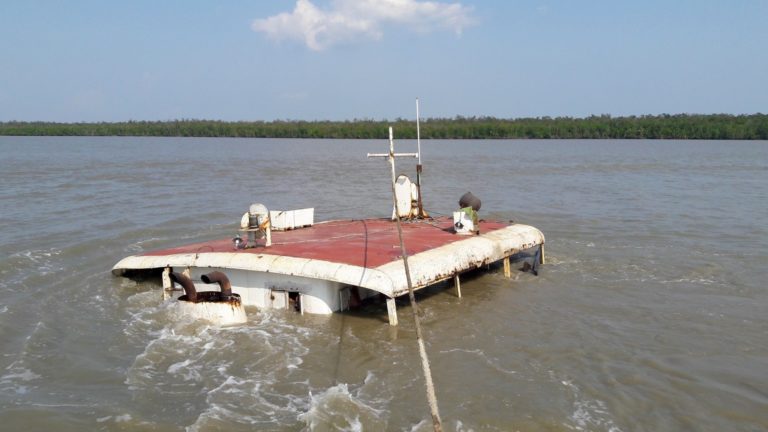
At 3:00 AM on April 15, the MV Bilash, a large bulk cargo vessel carrying 775 metric tonnes of coal, sank in the Pashur River watershed near Harbaria Point, upstream of the Sundarbans World Heritage Site. In July, the UNESCO World Heritage Committee issued a decision urging the government of Bangladesh to put an adequate management system in place for shipping to minimize negative impacts to the Sundarbans. This is the sixth time in four years that a cargo shipping disaster has occurred where the government of Bangladesh has had no preparation to manage these accidents. As of today, there is still no government action to clean up the coal barge that sank on April 15. The barge owner started recovering submerged coal from the barge manually on April 20.
The waterways flowing through the Sundarbans are home to the Dhangmari and Chandpai dolphin sanctuaries, created to protect the rare Irrawaddy and Ganges dolphins. Additionally, the Sundarbans is critical habitat for the endangered Bengal tiger.
Sharif Jamil, Coordinator of Waterkeepers Bangladesh said, “It is distressing to see that the current government has made not substantive progress in complying with the World Heritage Committee decision and protecting this unique World Heritage Site. Instead, they are allowing the destruction of the Sundarbans by allowing more shipping traffic and polluting industries to operate in this fragile ecosystem, claiming that the sunken barge poses no threat to the waters. It is unscientific and untrue to say this coal will do no harm to the water and biodiversity of the river Pashur, the lifeline of the Sundarbans.”
There has been no practical effort by the Bangladesh government to recover the vessel that has been polluting the Pashur River for more than a week. Additionally, the government has taken no measures to avoid these increasingly more frequent accidents. The governments of India and Bangladesh are aggressively moving forward with the construction of the proposed Rampal coal-fired power plant which will dramatically increase the shipping of coal, coal ash and gypsum pollutants through the Sundarbans.
“All these shipping accidents show that the leaders of India and Bangladesh are not taking steps to protect the Sundarbans; rather, they are attempting to increase damage and destruction,” said Pashur River Waterkeeper Noor Alam. “This accident again proves the carelessness of the government towards the protection of the Sundarbans and justifies the call to stop construction of Rampal on the banks of River Pashur.”
“Recent episodes of coal barges capsizing have increased the pollutant load contaminating the waterways and endangering the rare aquatic ecology of the Sundarbans,” said Donna Lisenby, Clean & Safe Energy Campaign Manager for Waterkeeper Alliance. “The Rampal coal plant must be stopped because it will lead to even more coal contamination of the Sundarbans and further imperil the World Heritage Site.”
Photos and videos of the spill site can be downloaded here. Please credit Noor Alam, Pashur River Waterkeeper.